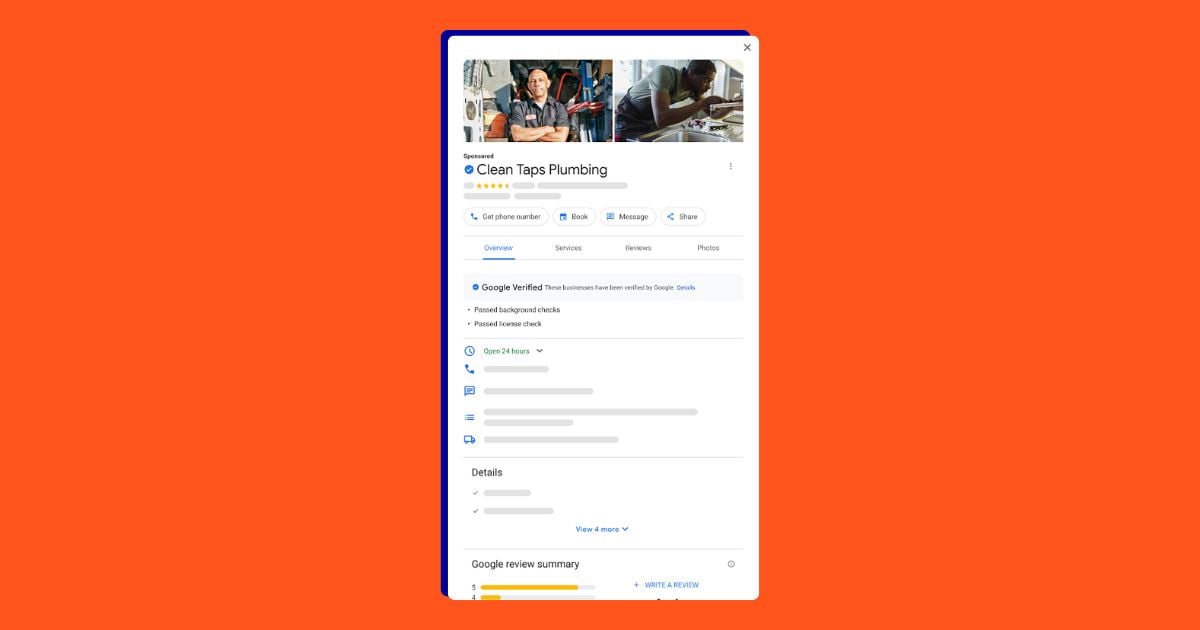Does Google Ads Work? Absolutely! (And here’s how Google Ads works).
Of course you might think I’m a little biased since I’m writing for the WordStream blog. But I work here because of my deep-rooted love of PPC, and I truly believe Google Ads can work for almost any business: small, medium, or large.
Throughout my time at WordSteam I’ve heard every excuse in the book as to why Google Ads doesn’t work, including “My leads don’t know how to use the internet” (like, REALLY dude!?). My 95-year-old great aunt knows how to use Google, so I’m really not buying this one. I can only begin to image what our sales reps hear on a day to day basis. I can remember one of the first clients I worked with trying to back me into a corner as to how this could possibly work for her business. Essentially, she wanted me to re-sell her the idea of paid search marketing… It was our second call… I wasn’t about to go into a sales pitch (the result would be a lot of um’s, uh’s, wells – I’m not a sales person).
Instead I’d like to address the most common arguments we hear about why Google Ads doesn’t work, and provide some counterarguments to show you why it actually DOES work. Because the fact is, Google is one of the most profitable companies on the planet for a reason – Google makes money from Google Ads because people keep using it! Check out how much money some of the biggest spenders on Google Ads spend annually – $40 to $50 million a year! No way they’d be dropping that kind of budget if they weren’t getting great ROI.
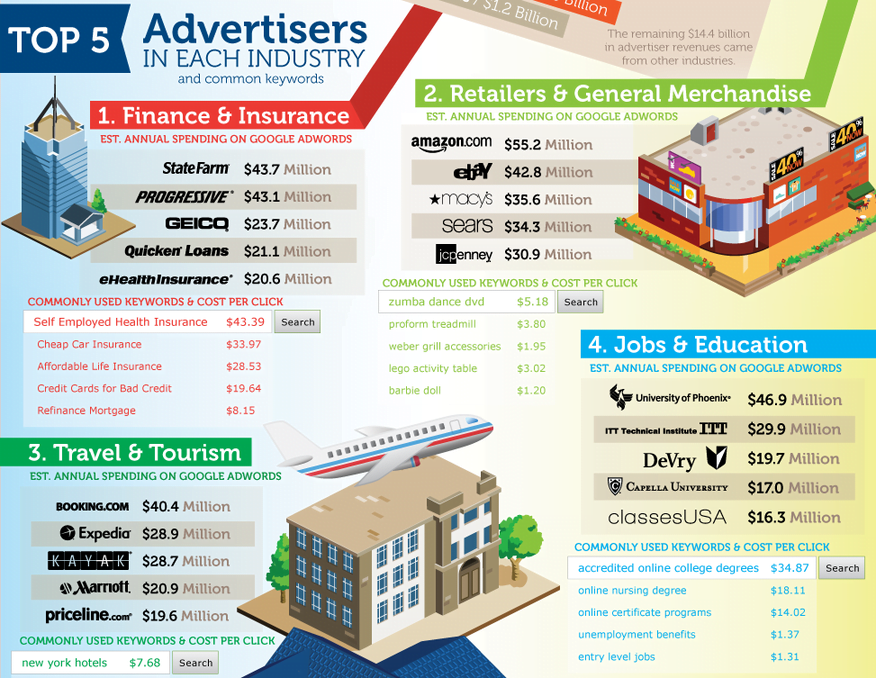
Now, if you’re still wondering “Should I use Google Ads?” read on for my responses to those common arguments…
Argument #1: Google Ads is too expensive!
“Google Ads is like throwing your money into a black-hole!”
“ROI is unreachable due to soaring costs.”
“You’re advertising on Google? HAH! Say goodbye to your marketing budget!”
“Google Ads isn’t worth it for small businesses.”
Alright, pipe down! Yes, Google Ads does cost money, and often when advertisers start out they might not allocate all of their marketing dollars to the right places, leaving them with a loss of faith in the platform. But it’s important to remember that all marketing channels cost money; the question is whether or not you’re getting return on that investment. Before abandoning Google Ads as a lost cause they should identify why it is costing so much.
More often than not when I look at new client accounts, they have let their Google Ads account run on auto-pilot or let an unqualified third-party run their account, and therefore, yes, they’re wasting a ton of money.
Here are a few things you can do to make Google Ads less expensive and more profitable.
- Learn how to use it: This is the number one reason people are usually wasting money – because they haven’t taken the time to learn Google Ads. Unfortunately, it’s not a self-explanatory, easy-to-understand system. It takes time, studying, and experience to understand the ins and outs of paid search. Spend time reading, watching instructional webinars, understanding things like account structure, match types, negative keywords, bidding strategies, and if you’re super ambitious get Google Ads certified.

- Use more restrictive match types: Are all of your match types on broad? Well, bingo, that’s why Google Ads is so darn expensive! With broader match types your ads are more likely to be served to a much larger, and sometimes irrelevant audience, leading to wasted clicks. I’m not advising that you stop using broad match keywords, but make sure to set up negatives to block irrelevant searches, bid on phrase and exact keywords at higher bids to get more relevant clicks, and regularly monitor your Search Query report to get a sense if you’re bidding on the keywords people are actually searching for.
- Set a realistic budget & bidding strategy: Determining budgets and bids can be a full-time job in itself, but don’t over-complicate the process. Map out what you’re realistically able to spend on each campaign and set your daily budget accordingly. What about bidding? For budget conscious advertisers I always recommend bidding manually to have the most granular control over your account without letting Google run the show.
- Make sure you’re not on Search with Display Display Select: Being on search and display can work great for the advertiser looking to get the most visibility and branding possible, but often users blindly chose this option and end up confused as the how their daily budget was depleted so quickly. Well, the display network is taking your ads and showing them across the web rather than just in the search results. The intent is different when browsing the web compared to doing a search, so typically I recommend splitting these campaigns and having separate strategies and budgets for each.
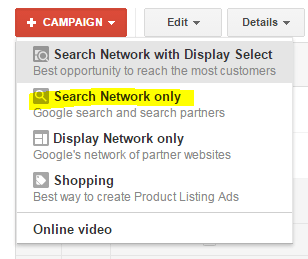
- Track spend: There can be so many reasons your spend gets out of control. Perhaps your keywords are triggering irrelevant clicks, or you’re using automated bidding that is quickly depleting your budget, or an algorithm update caused your spend to skyrocket. The main point here is that you need to be extremely active and review KPI’s and spend on a daily basis, even if you set aside just 10 minutes per day. If you do this, you’ll be guaranteed to not waste money on irrelevant clicks.
Argument #2: We have great SEO so we don’t need to pay for clicks
Oh, do you now? I laugh out loud, legitimately, out loud when I hear this argument (yes, I’ll put the client on mute whilst laughing). I refuse to believe this argument for several reasons, the main being that study after study can back up the fact that paid search complements good SEO and increases overall profitability.
I recently attended HeroConf in Portland, OR, where Bing Evangelist John Gagnon shared an interesting case study of an account that saw 32% gain in brand clicks from bidding on their keywords rather just relying on SEO to get the top spots.
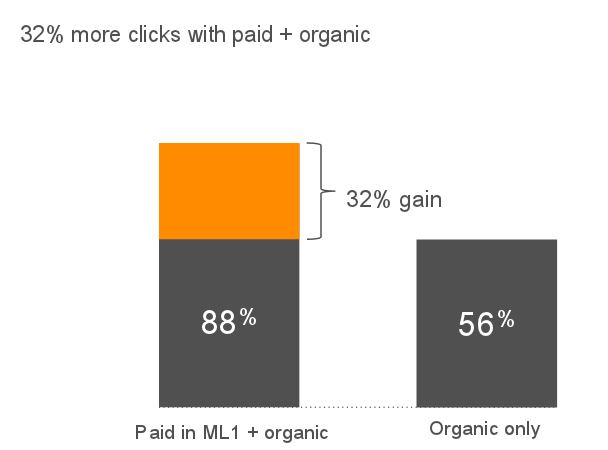
Yup, you should even be bidding on your own brand terms because your competitors likely are doing so, and therefore you’ll want to steal these clicks from them (it’s your OWN brand for heaven’s sake! And these clicks tend to be very cheap).
Further, when you want to target new keywords in organic search, it can take a long time for your content to rank – and sometimes, it just never does. But you can target new keywords with PPC right away, then determine very quickly if they’re worthwhile, profitable keywords for you.
Also, different types of keywords with different levels on intent drive different search behavior. SEO is great for informational searches and top of the funnel traffic, but search queries with high commercial intent tend to deliver very different SERPs with a lot more ads – sometimes nothing but ads above the fold. And for those types of high-intent, high-converting keywords, ads are often stealing most of the clicks. People may never get to your organic result at the bottom of the page.
Finally, the thing about great SEO is that it isn’t 100% reliable. You can follow all of the best practices, but top rankings aren’t guaranteed. Also, remember Penguin and Panda? No? Well, many marketers remember these Google algorithm updates clearly because they plummeted their organic traffic, leaving them in a puddle of panic. With PPC the control is in your hands. But the real winning formula is optimizing your site and content for SEO purposes, whilst implementing an effective paid search strategy.
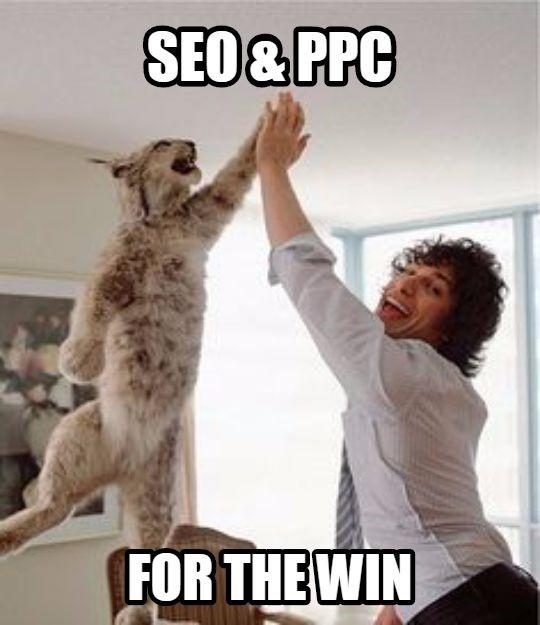
Are you already doing both, but doubting the effectiveness? Just check out the paid and organic report in analytics. It will help you fully understand the value of combining your SEO and paid efforts is having, and help you win bigger. “As a paid search marketer, you’ll be able to identify all the long-tailed queries for which organic is earning great performance and enhance your bid strategies accordingly,” says Thomas Stern, SVP of Clients Services at ZOG Digital. “To date, we haven’t found an account that doesn’t at least contain some top ranking keywords that we’ve proven should also be bid on with PPC.”
✴️ Want to make Google Ads work for you?
Free guide >> Hacking Google Ads: One Trick That Could Save You Thousands
Argument #3: The traffic I get from Google Ads never converts.
Oh dear, there’s a reason (or several reasons) for that! In all seriousness, this is a legitimate problem, but I know from experience that with effective management you can turn your paid search efforts into a conversion generating machine (unless your business is doomed to fail for lacking a quality product or offering).
Back in 2013 eBay faced a similar dilemma, threw their hands up, and made the bold claim that Google Ads doesn’t work. In response, they received a lot of backlash from marketers and business owners laughing in their faces and deeming eBay’s marketing team naïve and uninformed. The reality is eBay just sucks at paid search. Sorry eBay, I know I’m being a bit harsh, but let’s explore the reason why some companies, like eBay, fail to get conversions from paid search.
- Your account is structured poorly: Often times advertisers aren’t seeing conversions because there account is a disaster zone. Perhaps they’re targeting keywords that are either too broad, not relevant, or have awful quality scores. They’re likely not using negative keywords to block irrelevant searches, and their ad groups are probably stuffed with unrelated terms. Follow this guide to set up your account structure properly because the way your account is structured is the building blocks to achieving results with paid search.
- You’re abusing dynamic keyword insertion: The problem with eBay’s Google Ads account was clear: “eBay’s Google Ads strategy appears to be to pick every possible word in the dictionary and run them on Dynamic Keyword Insertion,” says Larry Kim. Dynamic keywords insertion is an option in Google Ads where you can dynamically insert a query searched for on Google into your ad to make the ad as relevant as possible and increase click opportunity. This strategy can work wonders if done well, but eBay abused DKI by bidding on irrelevant keywords and using them with DKI. Just look at the old example below that Larry shared for a search done for a perpetual motion machine.

Seriously? Be careful! If you’re new to Google Ads you might want to steer clear of DKI until you’re a bit more comfortable. It’s downright embarrassing to show up for unrelated terms.
- Your ads aren’t relevant: Ah yah! Relevancy can’t be stressed enough when it comes to Google Ads. Your keywords need to match your ads which need to match your landing page. If you searched for a pair of new sneakers and were directed to a landing page with hats you’d probably bounce back, and lose faith in that brand. This tip might seem obvious, but you’d be surprised at how many people group together a large set of keywords, directing to a specific ad not directly related to the keywords searched for, that then leading the searcher to their homepage. No wonder conversions aren’t coming in!
- Your landing pages suck: This one is often hard for marketers to stomach. Break your ego down a bit, and come to the realization that your landing pages might, well, suck… I know, I know, you spent hours upon hours designing them or perhaps you paid a contractor to create them. Well, if you’re getting clicks, but no conversions, it could be a landing page issue. Read up on best practices to revamp your landing pages, and don’t be afraid to run A/B tests to try out variations of a page. You might be surprised by the results!
- You’re not remarketing: Oftentimes, especially with B2B companies with longer sales cycles, you can’t rely solely on gaining conversions through search. You need to take it a step further. The easiest, and what I’ve found to be the most successful way to do this is with remarketing. Cookie your site visitors and follow them around with relevant offers. Remind them that you’re there. Nowadays people have browsing ADD, so you need to reinforce your brand and their need to buy your products or services.
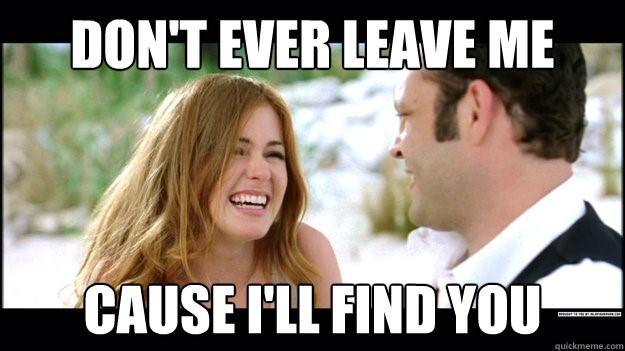
Argument #4: I don’t have time to manage it.
Another argument that I hear far too often. Yes, I understand paid search can be time-intensive, and if you’re not dedicating the proper time to evaluate, track, and tweak your PPC campaigns then your results could plummet or never arrive. What can be done? Well, nowadays there are so many tools and systems that can help drastically reduce the time spent on paid search. For instance, at WordStream we offer a tool called the 20 minute work week, which scrapes through your Google Ads account to identify areas that need improvement, for instance an ad that isn’t performing well, or a keyword that’s brining in irrelevant traffic and should be set as a negative. Make your life easier by implementing a time-reducing system to help you along the way. Here are seven more tips to help you save time in Google Ads.
So, stop making excuses! Google Ads does work as long as you’re putting in the effort to do it well. Humans are lazy by nature, so recognize this, and change your behavior to start growing your business through paid search.
So…Does Google Ads Work?
Yes, Google Ads works. Google Ads is an affordable form of advertising that allows for targeting qualified, in-market prospects, and if managed correctly, it can deliver strong ROI, helping you grow your business’s leads and sales. Even if your online presence from SEO is excellent, research shows that adding in Google Ads advertising produces significantly more clicks from search.


